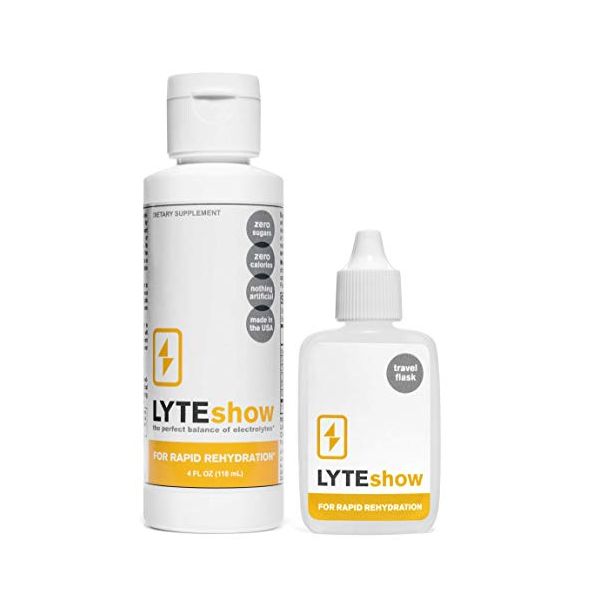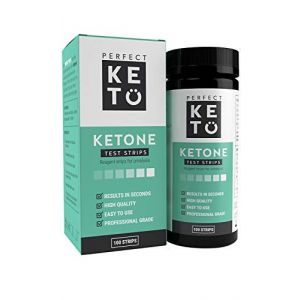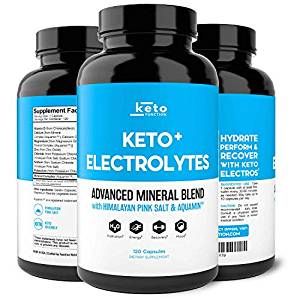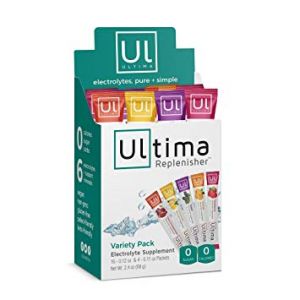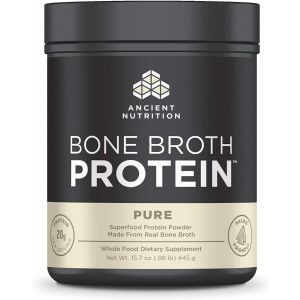LyteLine LyteShow Electrolyte Concentrate
3.0 mL (.6tsp), 4 fl oz (40 servings)
LyteShow is an electrolyte-replenishing, liquid concentrate dietary supplement for rapid hydration. The electrolyte and mineral-based formula is naturally sourced in the USA and clinically tested to be significantly more efficient for hydration than water alone.
Best For
Hydration [1-4]; Enhanced and sustained energy levels [1, 2]; Improved Mood [1, 2]
- Pros:
- LyteShow is an electrolyte-replenishing, liquid concentrate for rapid hydration
- Contains electrolytes and minerals naturally sourced in the USA
- Formula is clinically tested to be significantly more efficient for hydration than water alone
- Free from additives, sweeteners, carbohydrates, artificial colors, flavors, preservatives
- No calories
- Non-GMO, vegan, vegetarian, and gluten free
- No artificial ingredients, soy, starch, yeast, wheat, gluten, milk, eggs, or shellfish
Ingredients Concern: None discovered
Cons: This liquid concentrate adds a slightly tart and salty flavor to water. For people who are sensitive to the mineral flavor, it is recommended to add a dash of lemon or splash of juice, but not too much.
Dehydration is strongly associated with electrolyte imbalances and health issues such as headaches, mental fogginess, a lack of energy, muscle cramps and spasms, rapid heartbeat, lightheadedness, trouble sleeping, constipation, and bloating [1]. Hydration with electrolytes helps target each of these issues [2].
Electrolytes support the proper balance of water inside and outside of the body's cells; this ensures that organs and muscles function continuously [2].
Himalayan pink salt is a source of sodium, which is one of the most important electrolytes to replenish during activity as the loss of sodium is linked to muscle cramps and additional complications such as nerve problems [2, 3].
Potassium is the most abundant electrolyte in the body [4-6].
Low levels of magnesium are linked to electrolyte disorders [7-9].
Phosphate plays a role in nutrient and fluid transport [9]
Calcium plays a role in muscle movement and well as the circulation of fluid [9, 10]. Zinc has anti-inflammatory properties that heighten the body's ability to promote wound healing, including exercise-induced muscle damage [11].
Hydration [1-4]; Enhanced and sustained energy levels [1, 2]; Improved Mood [1, 2]
Sodium helps maintain fluid balance and supports proper muscle contractions, acid-base balance, and nerve function [2, 3]. Sweating causes the loss of sodium more than another other electrolyte [2, 3].
Potassium targets fatigue that is often linked to dehydration and it supports muscle contractions, urinary function, cardiovascular function, acid-base balance, digestive health, and the nervous system [4-6].
Magnesium supports proper muscle contractions and muscle relaxation during activity as well as glucose metabolism, which is involved in the production of energy [7-9].
Phosphate helps buffer fluid in and out of cells, it improves nutrient transport, and it promotes energy storage [9].
Calcium helps regulate fluid transport by influencing the narrowing and widening of blood vessels [9, 10]. It also plays a role in the regulation of the heartbeat, muscle contractions, and nutrient transport [9, 10].
Zinc improves the health through its ability to encourage detoxification, enhance immune system function, and it has also been shown to boost wound healing, including muscle tissue recovery after a workout, due to its anti-inflammatory activity [11].
Key Ingredients: Magnesium 40 mg; Sodium 125 mg; Zinc 2 mg; Chloride 390 mg; Potassium 130 mg; Sulfate 20 mg
All Ingredients: Magnesium 40 mg; Sodium 125 mg; Zinc 2 mg; Chloride 390 mg; Potassium 130 mg; Sulfate 20 mg; Sea water; Purified water; Low-sodium sea mineral concentrate; Citric acid (Non-GMP plant sources); Potassium Chloride; Zinc sulfate
Mix 3 mL of LyteShow with 32 ounces of water and enjoy. If desired, decrease the amount of water for a more concentrated mixture. Take as needed, but do not exceed 24 mL (8 servings) of LyteShow in a 24 hour period. Measure: 3 mL equals approximately 40 drops, 0.6 teaspoon, or 1 Travel Flask capful. To easily get 3 mL, fill the Travel Flask cap to the very top with LyteShow.
These statements have not been evaluated by the FDA. These products are not intended to diagnose, treat, cure or prevent any disease.
1. Popkin BM, D'Anci KE, Rosenberg IH. Water, hydration, and health. Nutr Rev. 2010;68(8):439-58.
2. Food and Nutrition Board, Institute of Medicine. Dietary reference intakes for water, potassium, sodium, chloride, and sulfate. Washington, DC: National Academy Press, 2005. Available at: http://www.nap.edu/openbook.php?record_id=10925
3. Binia A, Jaeger J, Hu Y, Singh A, Zimmermann D. Daily potassium intake and sodium-to-potassium ratio in the reduction of blood pressure: a meta-analysis of randomized controlled trials. J Hypertens. 2015;33(8):1509-20.
4. Adebamowo SN, Spiegelman D, Willett WC, Rexrode KM. Association between intakes of magnesium, potassium, and calcium and risk of stroke: 2 cohorts of US women and updated meta-analysis. Am J Clin Nutr. 2015;101(6):1269-77.
5. Dietary reference intakes (DRIs): recommended dietary allowances and adequate intakes, elements. Food and Nutrition Board, Institute of Medicine, National Academics. https://www.ncbi.nlm.nih.gov/books/NBK56068/table/summarytables.t3/?report=objectonly
6. Wang L, Cui Y, Zhang J, Zhang Q. Safety of potassium-bearing citrate in patients with renal transplantation: a case report. Medicine (Baltimore) 2017 Oct;96(42):e6933.
7. Rodriguez-Moran M, Guerrero-Romero F. Oral magnesium supplementation improves insulin sensitivity and metabolic control in type 2 diabetic subjects: A randomized double-blind controlled trial. Diabetes Care 2003;26:1147-52.
8. Douban S, Brodsky MA, Whang DD, Whang R. Significance of magnesium in congestive heart failure. Am Heart J 1996;132:664-71.
9. Food and Nutrition Board, Institute of Medicine. Dietary Reference Intakes for Calcium, Phosphorus, Magnesium, Vitamin D, and Fluoride. Washington, DC: National Academy Press, 1999. Available at: http://books.nap.edu/books/0309063507/html/index.html
10. Power ML, Heaney RP, Kalkwarf HJ, et al. The role of calcium in health and disease. Am J Obstet Gynecol 1999;181:1560-9.
11. Hodges RE, Minich DM. Modulation of Metabolic Detoxification Pathways Using Foods and Food-Derived Components: A Scientific Review with Clinical Application. J Nutr Metab. 2015;2015:760689.
Write Your Own Review

